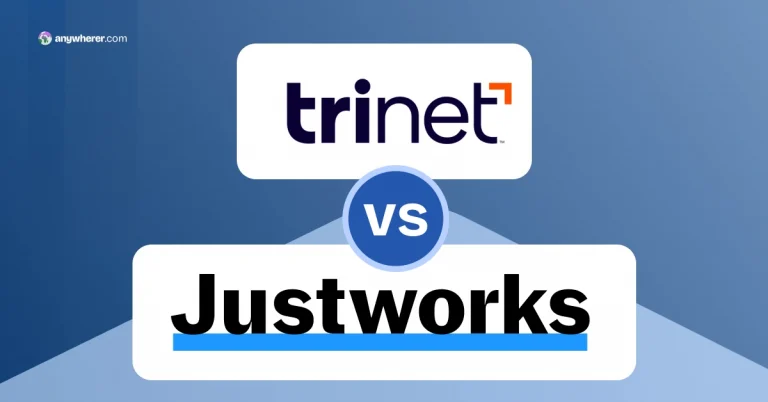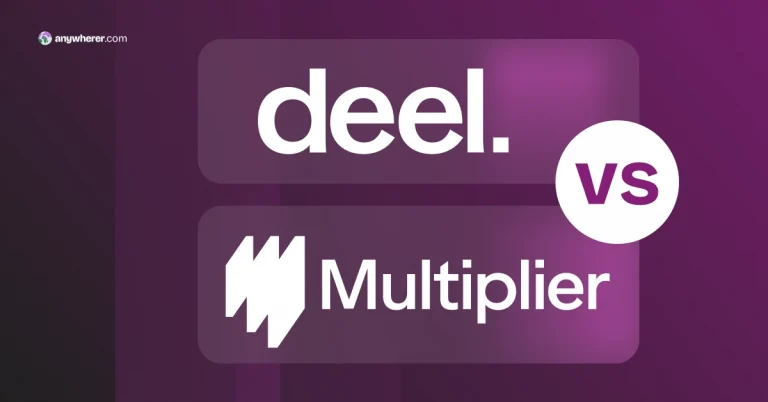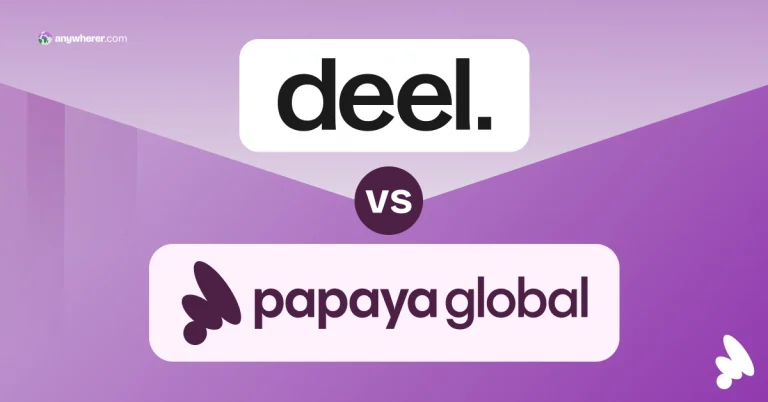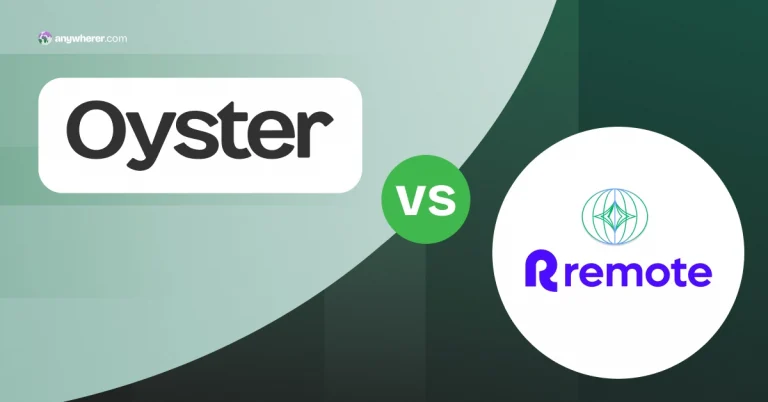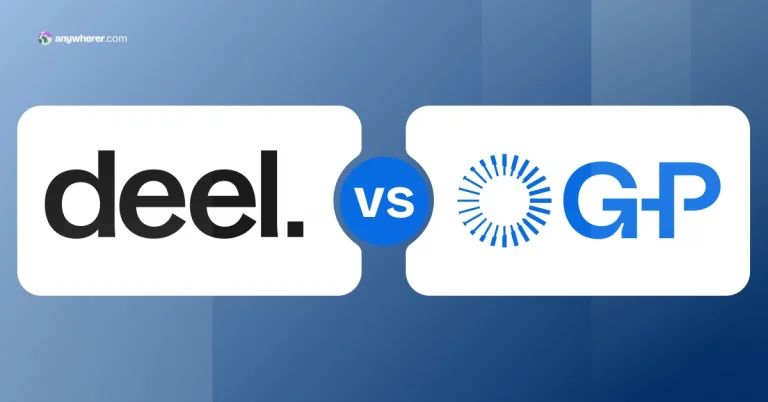Getting to Know Deel and Omnipresent EORs
Global expansion, operational efficiency, and complete workforce oversight — these are goals every business aspires to. That’s why many companies turn to EOR providers, with Deel and Omnipresent often topping the list as the Best Employer of Record firms.
So, what truly sets these two apart from other competitors — and which one is better suited to different business scenarios? In this in-depth review, we’ll explore it all — from functionality highlights and user feedback to differences in EOR fees and more.
Deel vs Omnipresent: Key Facts
Founded in
Headquarters
Annual Revenue
# of employees
Featured Clients
2019
San Francisco, CA
$500M
5,000+
Founded in
Headquarters
Annual Revenue
# of employees
Featured Clients

2019
London, United Kingdom
$44M
200+
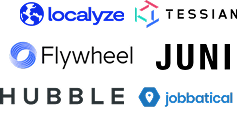
*All data referenced is accurate as of the publication date in May 2025.
Quick Snapshot of Deel versus Omnipresent
Before diving into a detailed comparison, it’s important to highlight some of the most vivid distinctions. So, at a quick glance, what are the main differences between Omnipresent and Deel? Let’s explore.
Wholly-owned legal entities vs a hybrid approach
Deel operates through 120+ wholly-owned entities, giving it full control over compliance, payroll, and HR processes, ensuring consistency and security without third-party reliance.
Omnipresent EOR, by contrast, uses a hybrid model — combining its own entities with local partners in some countries, which may vary in consistency depending on the region but offer more specialized local expertise and guidance.
Rich ecosystem of integrations vs integrated Omniplatform’s dashboards
Overall, Deel emphasizes integration flexibility — offering a robust ecosystem of third-party tools, a powerful API, and a customizable Workflow Builder to ensure seamless global workforce operations.
In contrast, Omnipresent takes a platform-first approach — highlighting easy-to-navigate, integrated dashboards that consolidate payroll, compliance, and HR operations.
Modular pricing vs bundled services
Deel uses a modular pricing structure with customizable monthly plans, offering optional add-ons such as visa support, mobility services, and equipment provisioning.
Omnipresent, in turn, offers a more fixed-fee approach that includes built-in support for onboarding, payroll, and compliance across its unified OmniPlatform — which ensures greater cost predictability but less flexibility to scale services up or down.
Deel vs Omnipresent: Core Differences
Comparison Points
Starting price for contractor management
Starting price per EOR
Countries covered
Platform’s core approach
Customer support channels
Free trial
Integrations
Starting at $49 per
user/month*
Starting at
$599 per employee/month
150+ countries
All-in-one global people platform that simplifies HR operations
24/7 Live Chat, Webform, WhatsApp, Email, Slack integration for enterprise clients
Yes
60+
Comparison Points
Starting price for contractor management
Starting price per EOR
Countries covered
Platform’s core approach
Customer support channels
Free trial
Integrations

Starting at £29 per
user/month*
Starting from
£499 per employee/month
160+ countries
Simplified global employment for distributed teams
Email, Help Desk, Phone Support, Chat
No
20+
*Kindly note that pricing is based on May 2025 rates, and all other data was accurate at the time of writing but may change thereafter.
Deel and Omnipresent Usage Breakdown
To better understand the focus areas and differentiators of Deel and Omnipresent, we’ve consolidated data insights on their most common usage across business sizes, industries, regions, and overall impact. Let’s take a closer look to see key discrepancies.
What businesses by size are the primary users of Deel and Omnipresent?
Deel has a slightly stronger foothold in the enterprise segment. However, when comparing medium-sized businesses to SMBs, Omnipresent shows a significantly stronger presence in the mid-sized segment.
- Enterprise: 10% of Deel’s clients, 8% of Omnipresent’s client base;
- Mid-sized businesses: 40% of Deel’s clients, 54% of Omnipresent’s client base;
- SMBs: 50% of Deel’s clients, 38% of Omnipresent’s client base.
Sources:
Which regions have the highest concentration of clients for these EOR providers?
As a viable Deel alternative for global teams, Omnipresent has a strong focus on Europe — with over half its clients in Europe. In contrast, Deel has broader global reach, with a stronger presence in Latin America and Asia compared to Omnnipresent. In the meantime, both have similar coverage in the Middle East and Africa, with Australia remaining a minor market for each.
- North America: 12% of Deel’s clients, 22% of Omnipresent’s client base;
- Europe: 12% of Deel’s clients, 52% of Omnipresent’s client base;
- Latin America: 39% of Deel’s clients, 12% of Omnipresent’s client base;
- Asia: 26% of Deel’s clients, 6% of Omnipresent’s client base;
- Middle East & Africa: 10% of Deel’s clients, 7% of Omnipresent’s client base;
- Australia: 0.5% of Deel’s clients, 1% of Omnipresent’s client base.
Sources:
In which business verticals are Deel and Omnipresent most popular?
Deel and Omnipresent have a similar share of clients in IT and Computer Software sector, making up over a third of each platform’s client base. Additionally, both also show relatively equal representation in Financial and Legal Services.
However, Omnipresent has a much stronger presence in Marketing and Advertising field — nearly tripling Deel’s share in that category. Meanwhile, Deel has a slightly higher proportion of clients categorized as “Other,” indicating broader industry diversity.
- IT & Computer Software: 37% of Deel’s and 35% of Omnipresent’s client base;
- Financial & Legal Services: 4.5% of Deel’s and 5% of Omnipresent’s client base;
- Marketing, Advertising, Translations: 4% of Deel’s client base, 11% of Omnipresent’s clients;
- Other: 51% of Deel’s client base and 45% of Omnipresent’s client base.
Sources:
Which challenges do Deel and Omnipresent help solve most frequently?
An analysis of customer success stories shows that Deel primarily focuses on global scaling and market expansion, while Omnipresent places greater emphasis on enabling operational efficiency for its clients. Besides, Deel also addresses compliance and time/cost savings more frequently than Omnipresent.
- Global hiring, scaling, and market expansion: 35% of Deel’s case studies and 29% of Omnipresent’s cases;
- Payroll, HR, and operational efficiency: 26% of Deel’s case studies and 57% of Omnipresent’s case studies;
- Time and cost savings: 19% of Deel’s case studies and 7% of Omnipresent’s cases;
- Compliance and legal simplification: 11% of Deel’s case studies and 7% of Omnipresent’s cases.
Sources:
Deel vs Omnipresent: Full-Spectrum Evaluation
To further explore specific areas of these EOR providers’ efficiency, this section provides a side-by-side comparison of Deel and Omnipresent based on experience, performance, global presence, and pricing. Dive into our insights for each category.
Deel vs Omnipresent Performance
Speaking of performance assessment, both providers provide robust solutions to ensure versatility, vast global coverage, and operational consistency.
Particularly, Deel puts a strong focus on automation and contractor support, offering end-to-end EOR support that includes payroll, benefits administration, tax compliance, and onboarding for both full-time employees and contractors. Its platform is known for capabilities that streamline payroll and invoicing, as well as ensuring global compliance at scale in over 150 countries.
Omnipresent, on the other hand, excels in providing a seamless employee experience — doing so through efficient onboarding processes, robust payroll management across jurisdictions, and centralized tools that empower transparency and simplify global employment operations.
Deel’s performance efficiency differentiators:
- Integrated, end-to-end approach to HR operations;
- Various streamlined and guided workflows — from onboarding to compliance and beyond;
- Numerous integrations with third-party tools to further enhance performance.
Omnipresent’s standout features that boost the solution’s performance:
- Payroll service automation with seamless support for local currencies;
- Automated employment documents collection;
- Global talent insights and cost estimates of hiring in various countries.
Platform Experience of Omnipresent and Deel Users
Deel stands out with a clean, easy-to-navigate interface, robust onboarding resources, and seamless integrations with over 90 tools. Besides, features like one-click payments, real-time analytics, and multi-device accessibility further enhance operational efficiency and usability.
Omnipresent, in turn, emphasizes centralized control and simplicity. Its dashboard is designed to consolidate global HR, payroll, and compliance functions into one streamlined view. Besides, the platform is praised for its intuitive layout and self-service tools that reduce admin overhead.
Deel’s user experience solutions:
- High level of flexibility in terms of localized employee agreements and workflows;
- Notifications on upcoming or recently updated regulatory changes, simplifying compliance complexity;
- In-house expert guidance assisting with operational efficiency for global teams.
Omnipresent’s usability highlights include:
- Streamlined, intuitive onboarding through an employee self-service portal;
- Transparent payroll, invoicing, and expense management processes;
- HR support services to further simplify workforce management and scaling.
Deel vs Omnipresent Presence
Omnipresent operates in over 160 countries, leveraging a network of local partners to deliver region-specific expertise. Its tools — such as the country comparison feature and OmniAtlas — help companies navigate local laws, benefits, and employment practices.
Deel, with a presence in over 150 countries, equally offers integrated compliance tools and solutions to manage global payroll, taxes, benefits, and regulatory nuances across diverse jurisdictions.
Deel’s features for global business efficiency:
- Flexible payroll solutions with support for 120+ currencies;
- Advanced dashboards showcasing global hiring trends;
- Guaranteed 24/7 support across various time zones and locations.
Omnipresent’s global hiring highlights include:
- OmniAtlas solution enabling hiring in 180+ countries;
- Country comparison tools, global hiring guides, and other helpful tools for global insights;
- Clear multi-country compliance guidelines backed up by Omnipresent’s team of experts.
Pricing: Deel vs Omnipresent
Deel uses a modular pricing model, which implies a collection of customizable service packages and a variety of add-on solutions and tools — including HR management, visa support, equipment provisioning, advanced HR analytics, and more. This lets businesses customize their EOR setup, scale as needed, and pay only for the services they use.
Deel Pricing
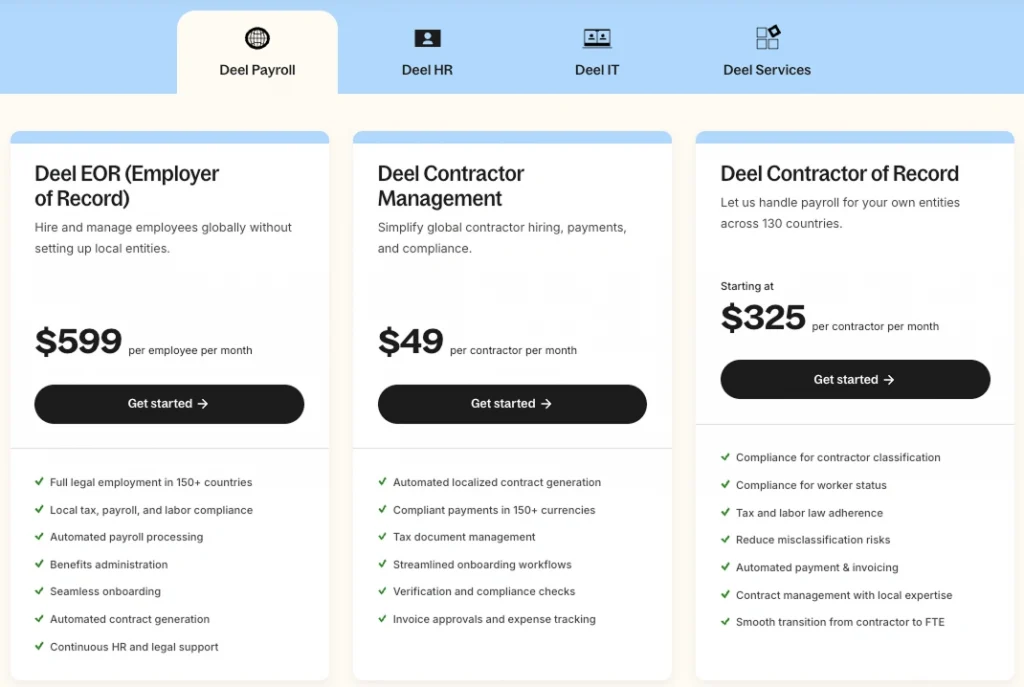
Omnipresent offers flexible pricing plans based on the type of service required — EOR, PEO, VEO, or contractor management. Starting at £29/month for contractor management and £499/month for EOR services. It also provides custom pricing and an OmniCalculator to estimate total hiring costs, including taxes and benefits.
Omnipresent Pricing
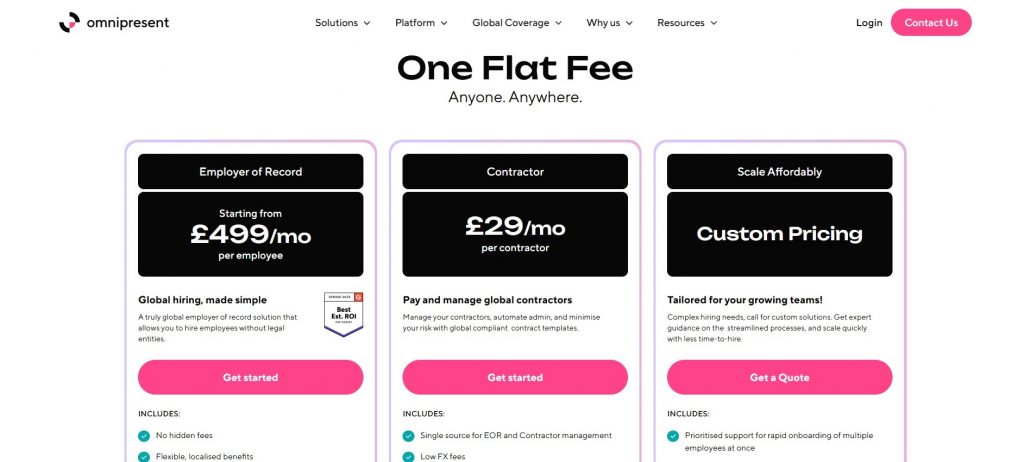
User Insights into Deel and Omnipresent: Strengths & Considerations
In this section, we’ll review what real users are saying about these EOR solutions, highlighting Omnipresent and Deel pros and cons. Which features are most liked? What are the critical aspects to consider? How do Deel and Omnipresent compare in terms of customer service? Explore the details below.
Deel vs Omnipresent: User Reviews and Ratings
Based on user feedback, Deel stands out for its intuitive, user-friendly platform and strong payroll efficiency. In doing so, it offers a streamlined onboarding process, valuable features for scaling businesses globally, and responsive, knowledgeable customer support.
Similarly, Omnipresent is recognized for being a convenient and easy-to-use solution, with efficient payroll handling and onboarding. Judging from user review, it supports global expansion with helpful features and offers quick, responsive support — contributing to a smooth user experience, especially for distributed teams.
Deel and Omnipresent EOR:
Strengths Based on User Reviews
Convenient, user-friendly solution
Payroll efficiency
Helpful features for businesses scaling globally
Fast response time of support team

Ease of use, intuitiveness
Streamlined onboarding
Helpful, knowledgeable customer support
Cost transparency
While Deel is praised for its global coverage and modular service offerings, users often report concerns over high total costs due to hidden fees, occasional delays in payments, and inconsistent customer support. As for Omnipresent, consider limitations in customization and reporting capabilities and potentially limited expertise and support for certain regions and countries, which might diminish its perceived value for money.
Deel and Omnipresent:
Considerations Based on User Reviews
High total expenses, including additional fees
Limited customization and reporting
Occasional payment delays
Inefficient customer support

Price vs value ratio
Lack of payroll transparency
Tax management inefficiencies in certain countries
Communication issues
Omnipresent vs Deel: Feature Differentiators
Deel and Omnipresent offer a comprehensive toolset to support global hiring and workforce efficiency. Let’s review them in detail.
Deel Payroll
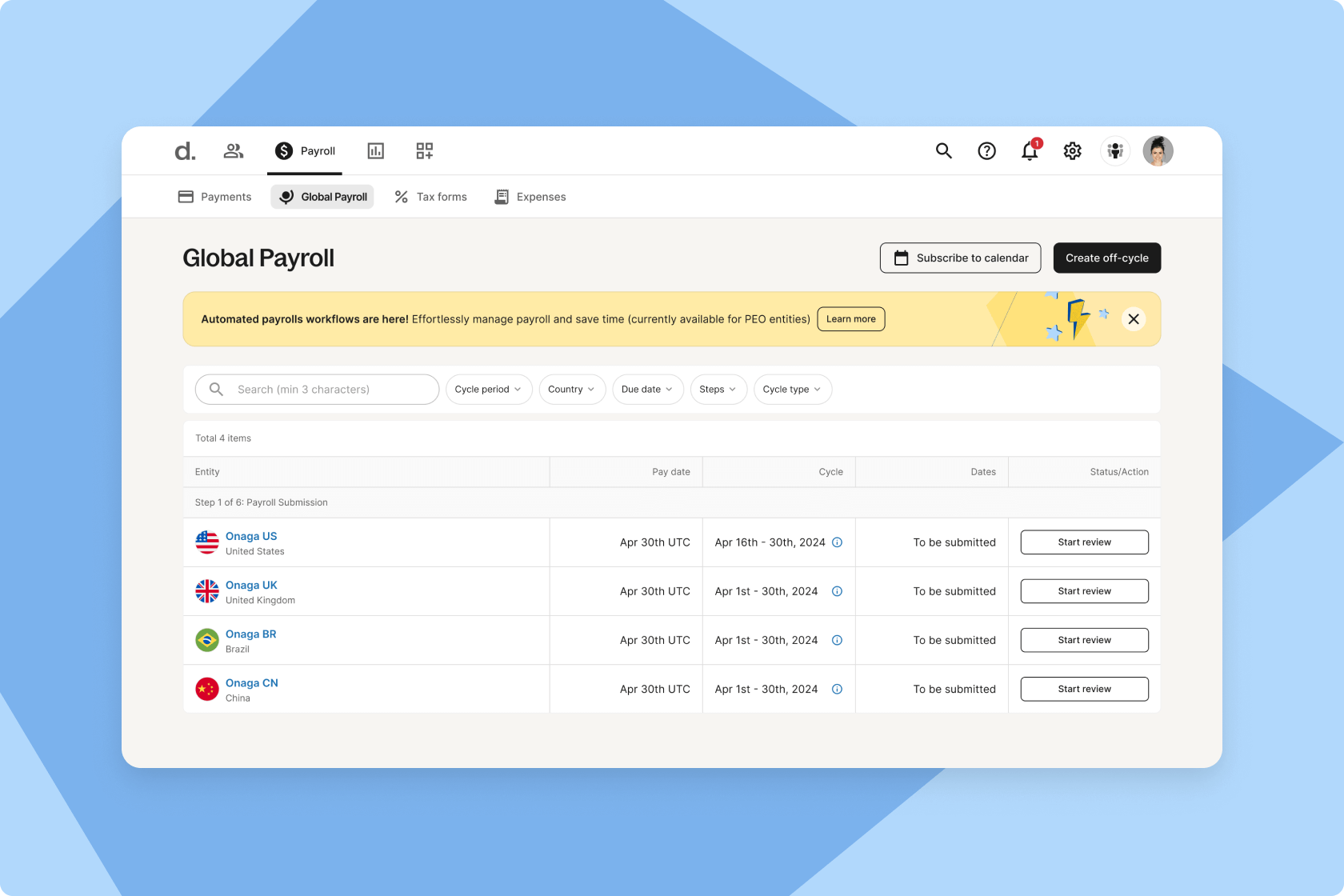
With 50+ in-house payroll engines, Deel empowers multi-currency support and cross-border payment capabilities ensure reliable payouts to global teams — both contractors and full-time staff. Additionally, employers can also manage pay schedules, customize payment methods, and track all transactions in a centralized dashboard with audit-ready reports.
Deel’s payroll capabilities incorporate:
- Bulk payroll processing allowing for easy payments management in a single transaction.
- Built-in compliance payroll tools to ensure correct deductions for income tax, social security, and local benefits.
- Deel Card as a convenient way to receive payments in major global currencies or via local currency payouts.
Omnipresent Payroll
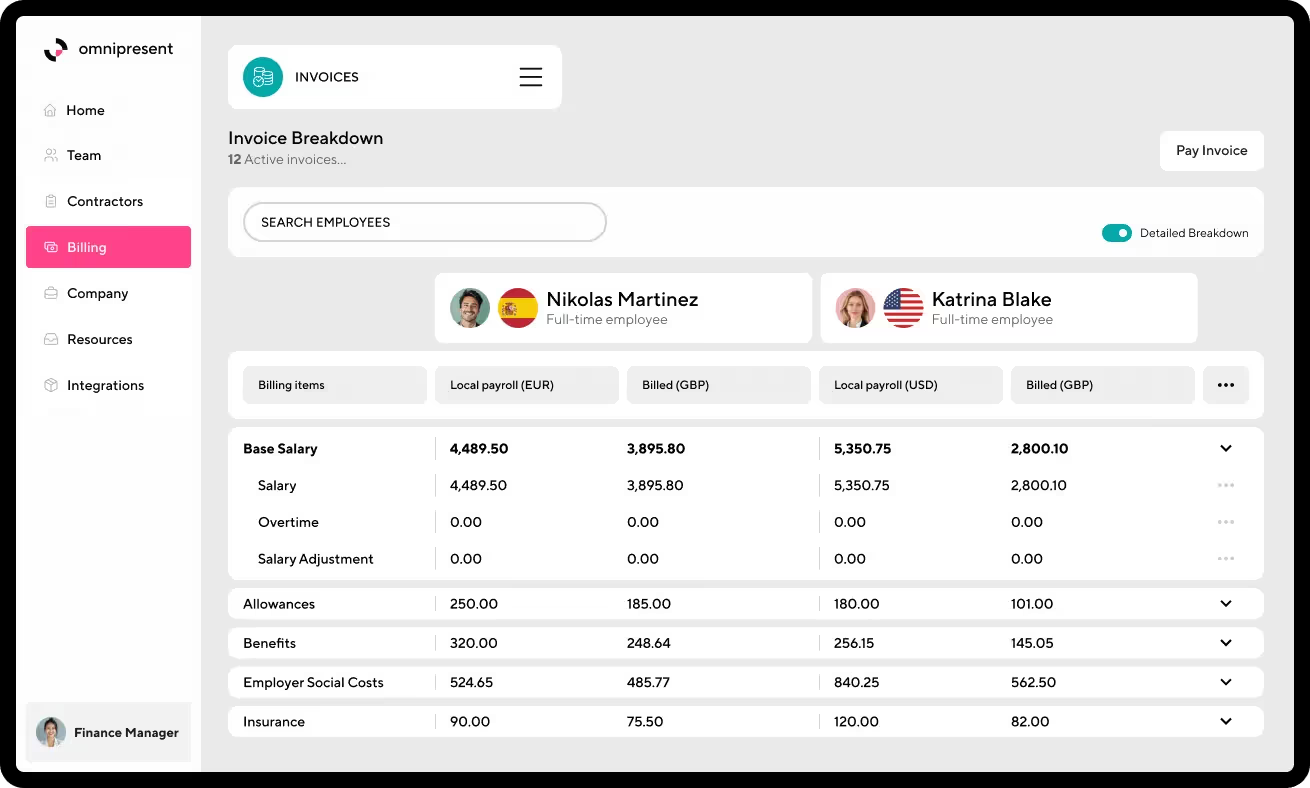
Omnipresent offers consolidated, flexible payroll management and invoicing that combines salaries, taxes, and employee benefits into a single monthly statement. Besides, its built-in payroll automation capabilities streamline the calculation and payment of local taxes, social security contributions, and statutory benefits — all while ensuring full compliance with country-specific labor laws.
The platform’s payroll functionality incorporates:
- Accommodation to various payroll cycles, including the management of 13th and 14th-month salaries.
- Multi-currency payments support combined with 15+ payment methods.
- Consolidated payroll reports and data insights — headcount tracking, gross-to-net calculations, and more.
Deel Contractor Management
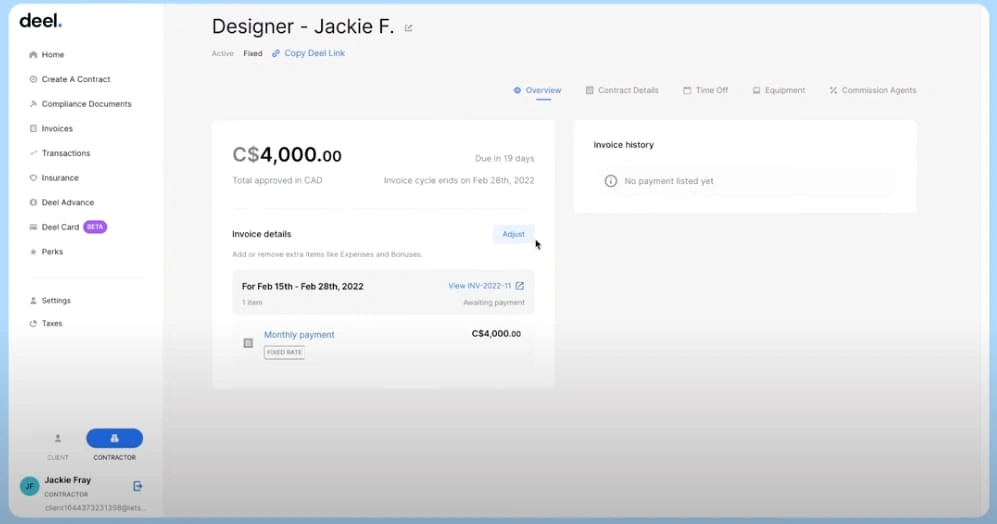
Deel’s contractor management system supports legally vetted, customizable contracts in multiple languages and currencies. On top of that, employers benefit from automated classification checks, transparent engagement records, and detailed contractor lifecycle management — allowing them to scale flexible global teams without the legal and administrative burden.
Deel provides efficiency with these contractor management features:
- Automated, localized contract generation with built-in e-signing workflow.
- AI-driven worker classification tool to reduce the risk of associated penalties.
- Centralized dashboards to manage contractors, their payments, IT devices, and more.
Omnipresent Contractor Management
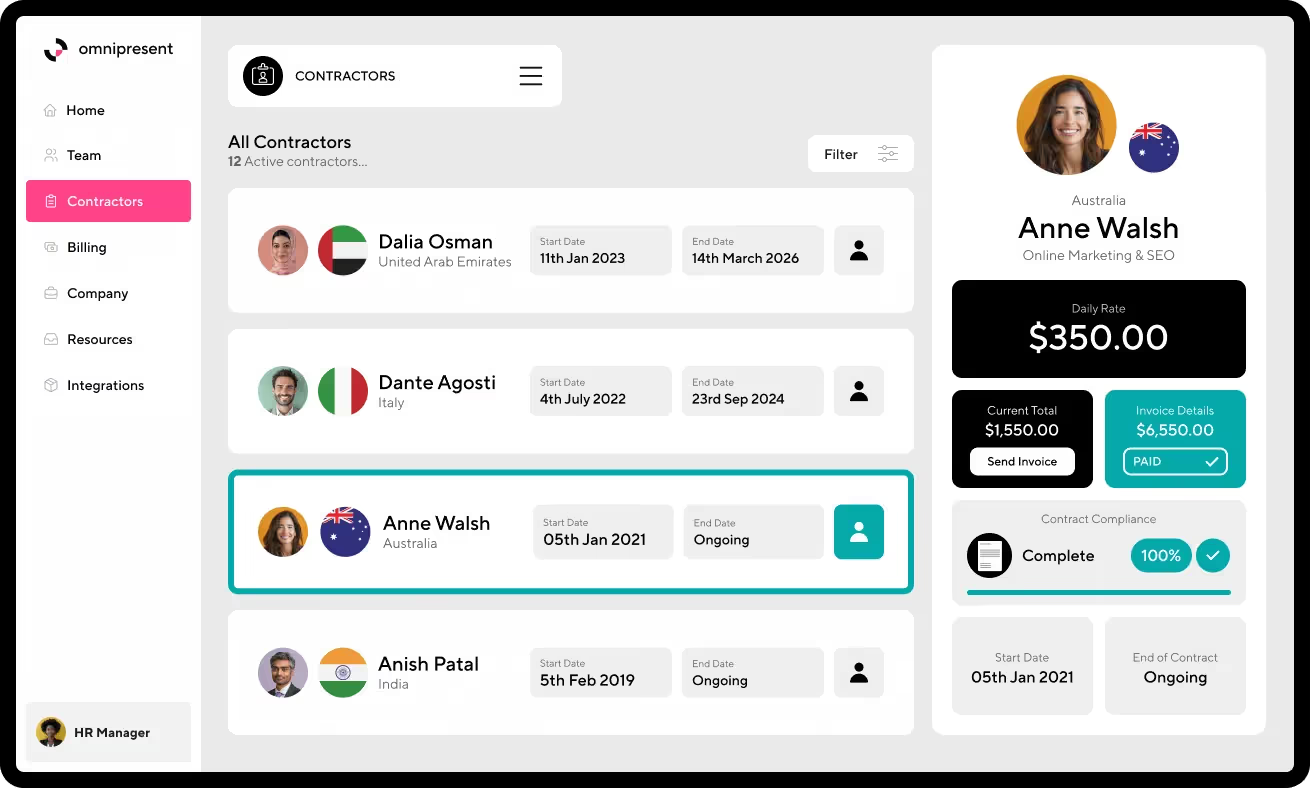
Omnipresent provides compliant, ready-to-use contract templates tailored to each jurisdiction across numerous countries. Besides, the platform’s built-in tax form collection significantly streamlines contractor onboarding, all while minimizing compliance risks.
Omnipresent’s functionality highlights in this area include:
- Real-time status tracking of onboarding, document collection, and payment cycles.
- Notifications on missing or incomplete documents.
- Automated contract creation and renewal workflows.
Deel Expense Management
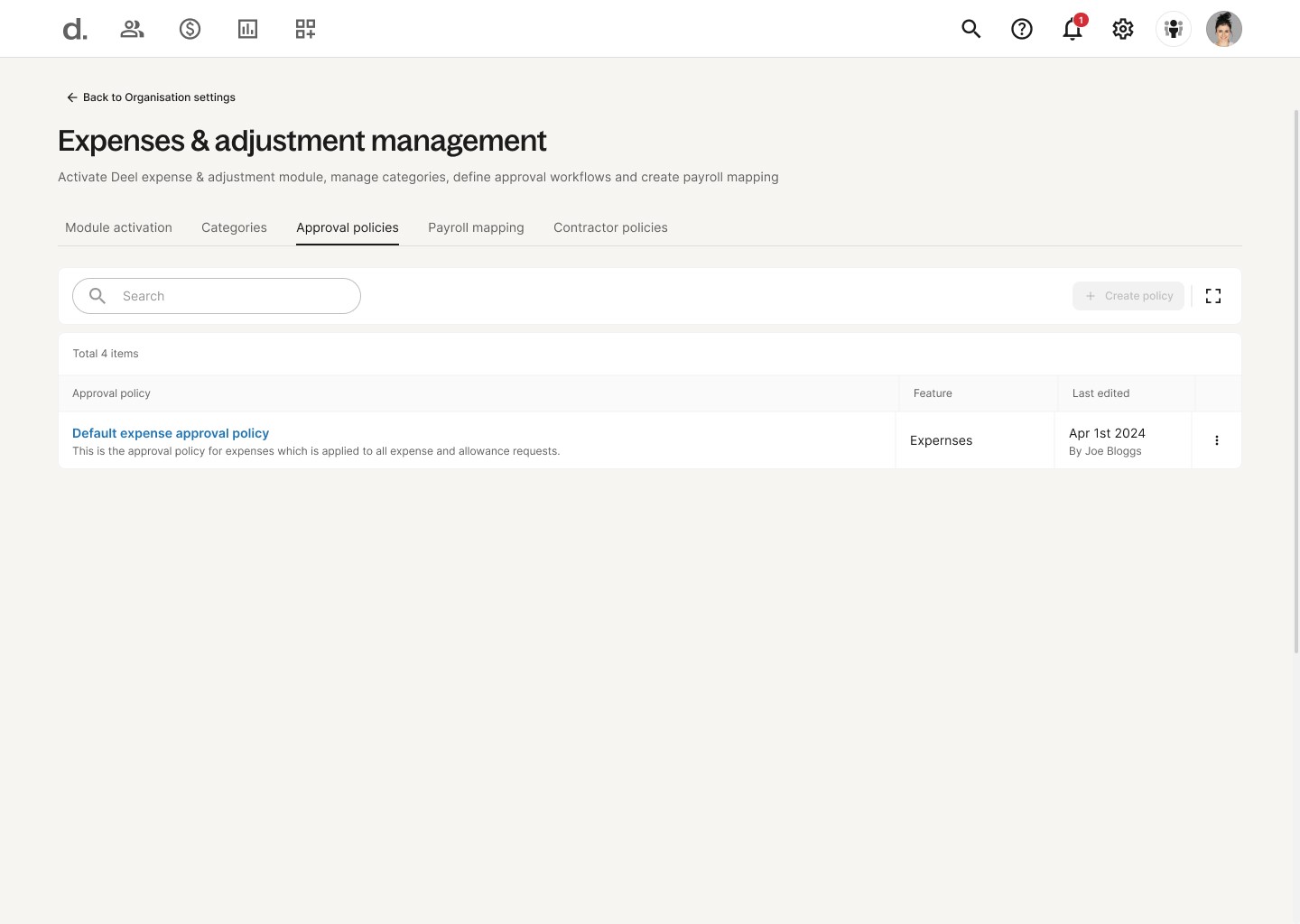
Deel’s expense management system is designed to simplify and centralize how businesses handle employee and contractor reimbursements across global teams. The platform enables companies to create custom expense categories, define approval workflows, and set spending limits. This way, Deel makes it easy to track, approve, and reimburse expenses with minimal manual effort.
Deel’s expense management capabilities are:
- Customizable expense categories and approval policies.
- Automated expense submission with the ability to upload receipts and make invoice adjustments with ease.
- Role-based review and approvals.
Omnipresent Expense Management
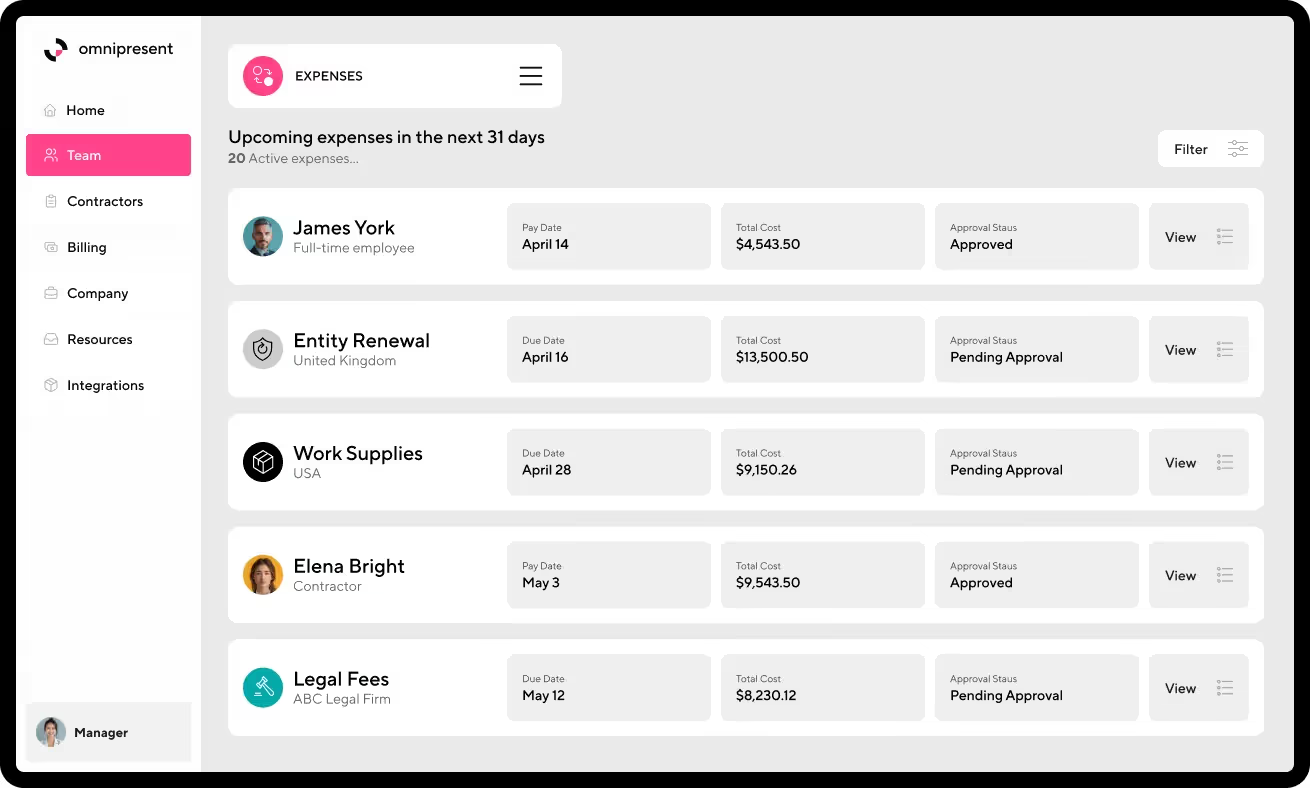
The OmniPlatform offers a comprehensive expense management system that allows employees to submit expenses directly through the platform. Meanwhile, managers can review, approve, or reject expense claims easily, ensuring full control across teams and regions.
This area’s feature highlights are:
- Easy expense submission and management from one centralized dashboard.
- The ability to upload receipts, categorize expenses, and submit claims with just a few clicks.
- Automated notifications and approvals for both employers and contractors.
Deel Global Compliance
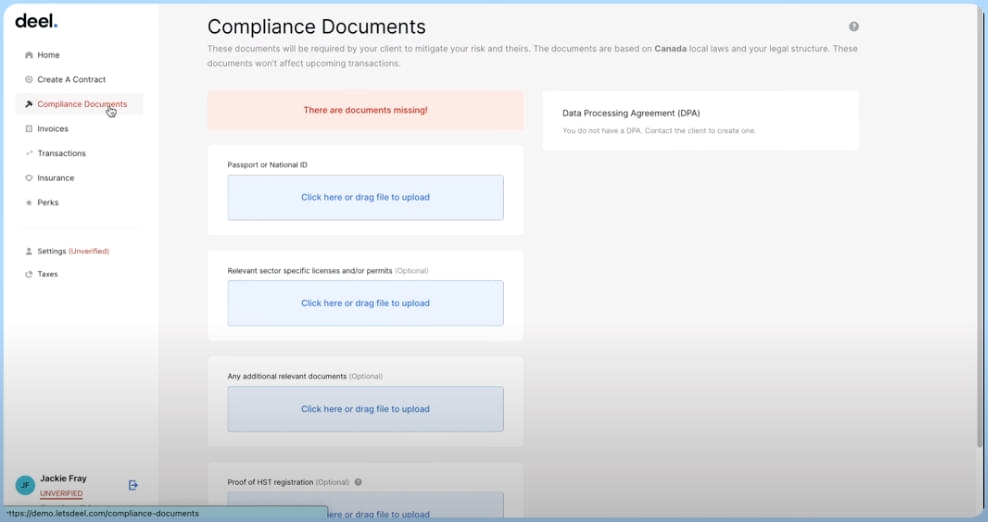
Deel is one of the strongest Omnipresent platform alternatives in terms of compliance — designed to reduce your legal exposure from day one. In doing so, the platform generates a tailored checklist of compliance documents based on country-specific tax residency and entity structure. Thus, as you scale across borders, Deel ensures that every worker engagement begins with the right legal documentation.
Key features include:
- Built-in legal guidance eliminating manual compliance checks.
- Automated notifications for upcoming expirations or missing files to ensure compliance.
- A secure, centralized solution to easily upload, store, and retrieve documents.
Omnipresent Global Compliance
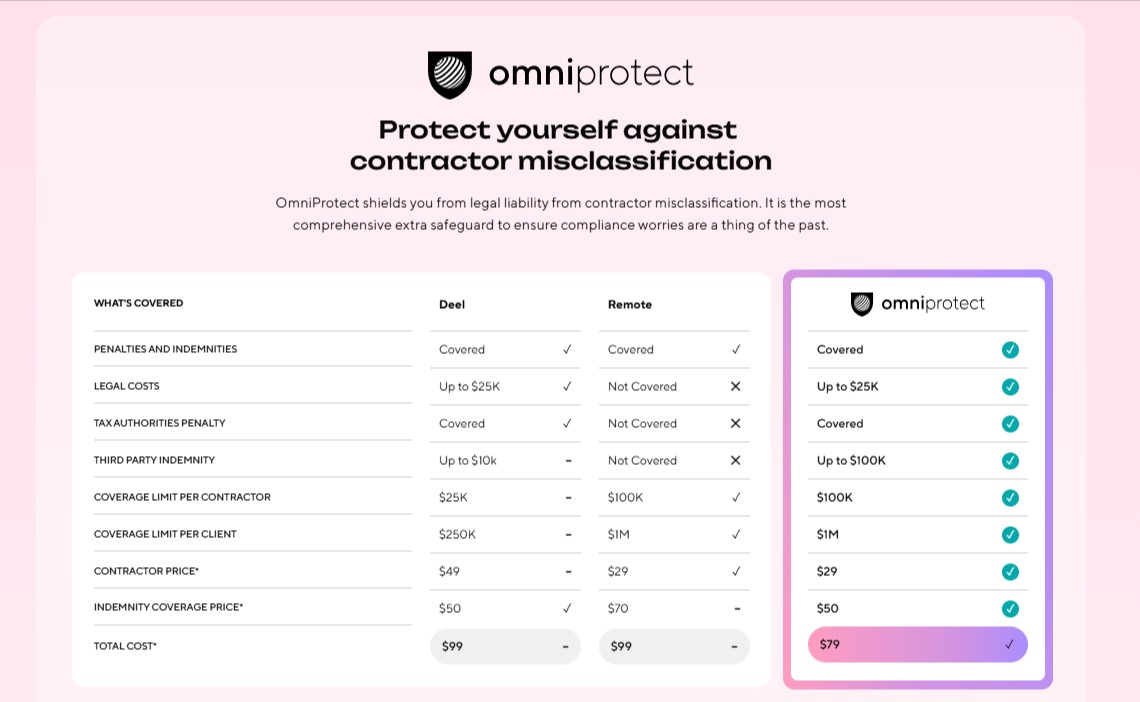
Omnipresent simplifies global compliance by generating a tailored set of legal and regulatory documents based on the employee’s country of residence, legal status, and employment structure. This way, the platform ensures that every contract and document aligns with local labor laws, helping businesses mitigate compliance risks and maintain legal integrity across borders.
Key capabilities include:
- OmniProtect — Omnipresent’s proprietary compliance safeguard minimizing the risks of contractor misclassification.
- Built-in compliance checks — including employment contracts, NDAs, IP agreements, and tax forms.
- Localized templates and consistent documentation standards across all countries.
Deel Integrations
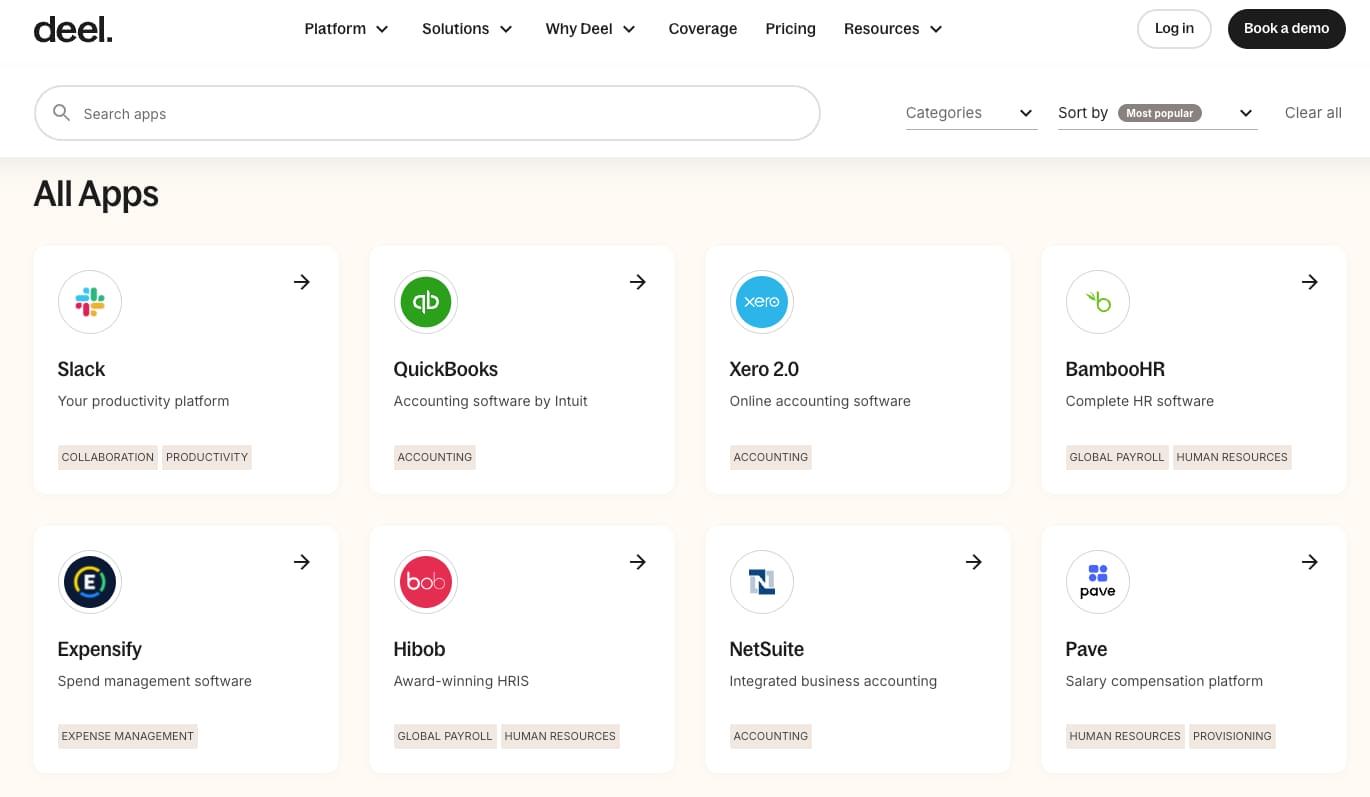
Deel features a rich collection of 60+ pre-built integrations to streamline various HR-related operations. On top of that, Deel’s Workflow Builder lets you automate onboarding, offboarding, and communication processes tailored to specific roles and regions. Plus, for deeper customization, the Deel API enables seamless connections with any HRIS, finance, and ERP platforms you might need.
Deel’s featured integrations include:
- Productivity and time tracking tools (Hubstaff, Google Workspace, etc).
- Automation solutions (Zapier, Versori, Drata, Boon, etc.).
- Equity management (Ledgy, Carta, Pulley).
- Learning management (Workademy, 360Learning, etc.).
- Performance management (15Five, Confirm, etc.).
- Payroll & HRIS solutions (Workday, Lucca, BambooHR, etc.).
Omnipresent Integrations
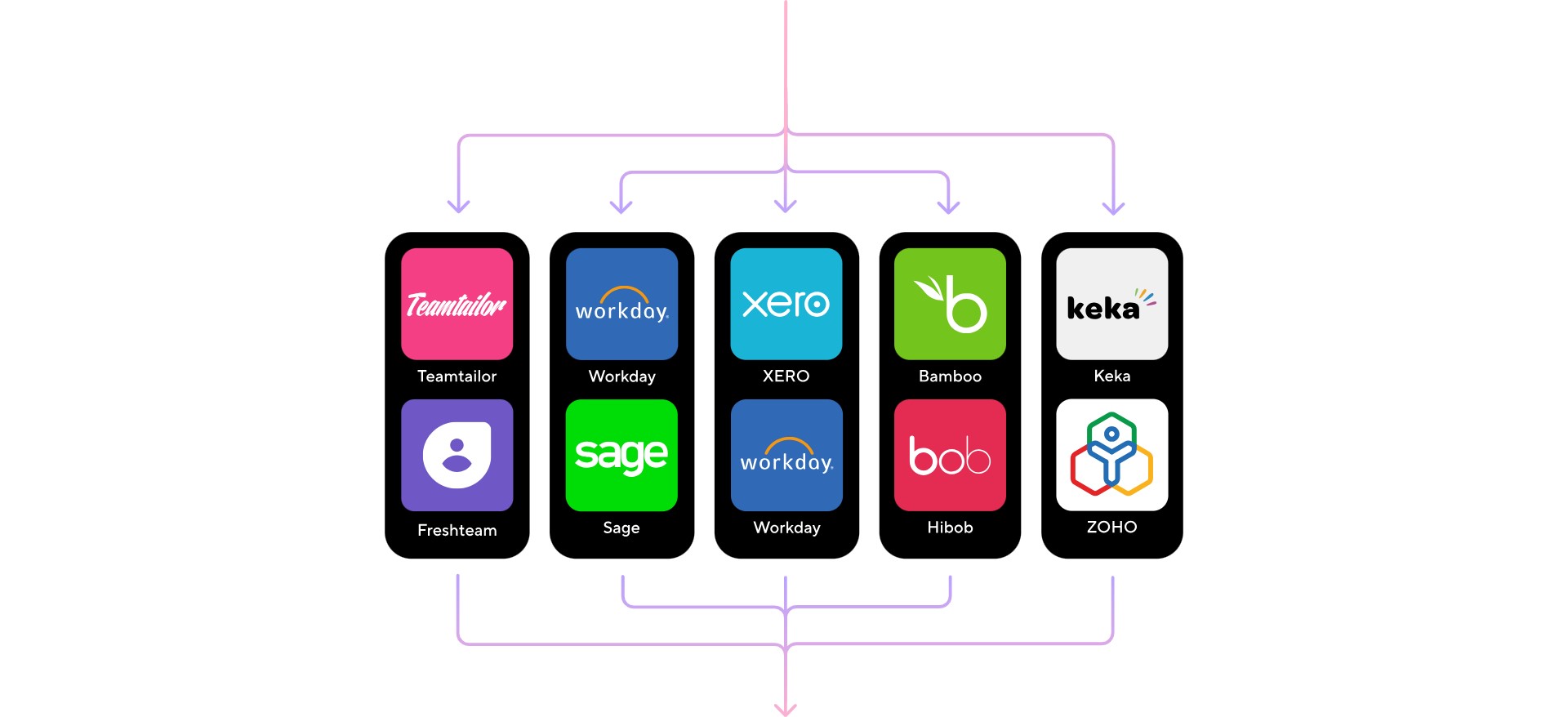
Even though Omnipresent’s collection of third-party integrations is significantly lower compared to Deel, the platform supports all key tools for ensuring seamless workflows throughout an HR tech stack. From onboarding to ongoing HR operations, it empowers you to build and support a global team with just a few clicks.
Omnipresent’s key integrations include:
- HR management systems — BambooHR, Hibob, Freshteam, Workday.
- Recruitment solutions — Teamtailor, Workable, Greenhouse.
- Payroll management — Gusto, Paylocity, Dayforce.
- Accounting tools — Xero, Sage, QuickBooks.
Final Take: Choosing Between Deel and Omnipresent
Both EOR providers offer a rich suite of tools for global hiring, cross-border payroll efficiency, and seamless HR operations at scale.
In the meantime, each solution offers its own unique set of benefits and capabilities — whether it’s OmniAtlas for country-specific employment insights, OmniProtect for contractor compliance safeguards, or Deel’s AI-driven worker classification and customizable Workflow Builder for seamless, automated workflows.
Moreover, the contrasting regional strengths — Omnipresent in Europe and Deel in LATAM and APAC — could signal where each provider has optimized infrastructure and local expertise. Therefore, before selecting your EOR provider, take time to assess your regional focus and business needs — be it Deel’s integration flexibility, Omnipresent’s intuitive platform, or other key considerations of Deel and Omnipresent alternatives.
Curious about reviewing other top EOR providers?
Explore Oyster HR competitors to uncover new insights and opportunities for your business.
FAQs on Deel vs Omnipresent
What are the key differences between Omnipresent and Deel?
Summing key differences, Deel offers modular, customizable services with 60+ integrations and fully-owned entities — while Omnipresent follows a platform-first, fixed-fee model with a streamlined dashboard and hybrid entity approach.
How do Deel and Omnipresent compare in terms of global coverage?
Both EOR providers have strong global presence. Particularly, Deel operates in 150+ countries through its fully owned entities and a big presence in Latin America and APAC. Omnipresent, in turn, covers 160+ countries and has a comparatively higher percentage of European-based clients in its portfolio.
What services does Deel offer that Omnipresent doesn’t?
Deel offers visa and global mobility support, in-house equipment provisioning, and localized benefits administration — services not directly promoted by Omnipresent.
What is the pricing structure for Deel vs Omnipresent?
Deel uses modular pricing featuring a range of add-on services, while Omnipresent has fixed-fee, pre-packaged suite of services with custom pricing for enterprise-level customers.
How do Omnipresent and Deel compare in terms of customer support?
Both platforms are equally praised for responsiveness and customer support efficiency — however, Deel offers slightly more diversified customer support channels, including 24/7 live chat and Slack integration — which sets it apart among Omnipresent competitors.
Request an in-depth consultation to get a more personalized Deel vs Omnipresent review aligned with your specific business needs

Yaryna is our lead writer with over 8 years of experience in crafting clear, compelling, and insightful content. Specializing in global employment and EOR solutions, she simplifies complex concepts to help businesses expand their remote teams with confidence. With a strong background working alongside diverse product and software teams, Yaryna brings a tech-savvy perspective to her writing, delivering both in-depth analysis and valuable insights.



